June 2024: Issue 42
Notes from the Cellar The Porch Napa Road Show You Spin Me In Watermelon Sugar
by Joey Wolosz | Published July 01, 2024
A Note from Joey Wolosz
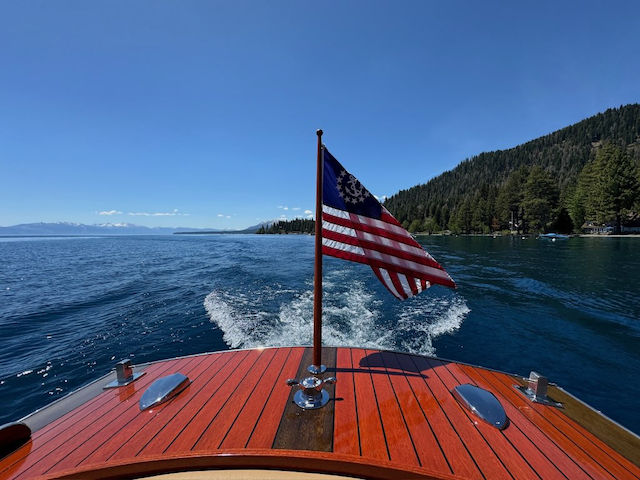
June began with a weekend on Lake Tahoe with good friends Jason, David, and Stan. With the newly opened studio space in downtown Napa, Jeff and I have had little time to slip away. This mini getaway was our well-deserved break to cool down and chill out. We spent our three-day weekend at our little cabin on the West Shore, known to many as the best shore. Jason and David arranged for a Saturday afternoon on the lake aboard a 36-foot commuter boat made of Philippine mahogany named Wild Goose II. It was a day of sun, fun, chilly rosé, and even chillier Lake Tahoe.
I feel a case of the Winchester Mystery House-itis as there seems to be always something under construction. I really can’t complain, our wine garden is swiftly taking shape. We have been able to pack a lot into a Lilliputian space with decking and tile installed, and trees and heather planted. Flower boxes are being fitted under the windows and a rope and pulley system will allow us to ferry baskets of wine and plates of snacks to outdoor guests. We are transforming the side alley yard into a space you’d want to spend a long, lingering afternoon and should be guest-ready in a week.
In June, we began our partnership with the French bistro Chapeau! in San Francisco, co-hosting vintner dinners on Sundays. Chef Philippe Gardelle has created five-course menus to pair with our Napa Valley and Sonoma Coast wines.
In this issue, we heat up the porch, share notes from the road, take a spin with DJ Rotten Robbie, and cool down with a basil-watermelon treat.
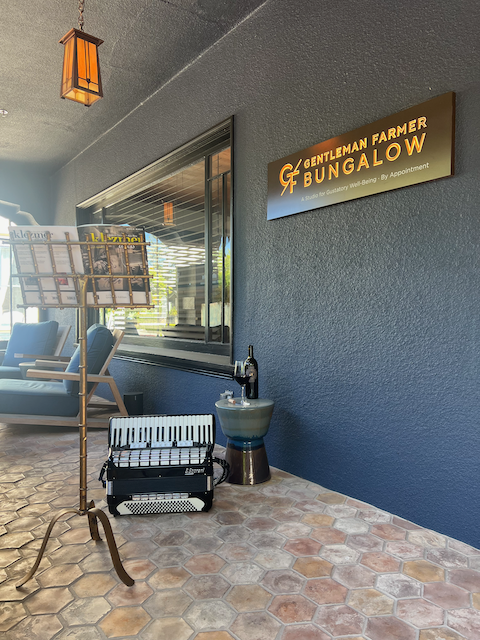
Mark your calendar. The last Sunday of July is traditionally Porchfest in Napa, with many porches of historic homes near the downtown area, hosting bands and playing music.
This year, the organized event will not be happening; however, the Gentleman Farmer Bungalow is going rogue, hosting our own version with our house band, Phat Ankle, playing on our front porch. Jeff and I will be whipping up tasty porchetta snacks and serving chilled rosé and Chardonnay. We are calling it Porch-etta Fest. If you find yourself in downtown Napa that day, please stop by. You will be entertained.
As long as your calendar is open, flip to October and mark October 5, 2024 for Yountville Days Parade. Gentleman Farmer will, once again, have a float in the parade. Still waiting on the Parks and Rec Department to give us the theme. Stay tuned.
We spent Father’s Day weekend in Carmel, Indiana, at the home of good friends, Kyle and Megan. Their home on Lake Geist was a dreamy summer evening’s playground to host 30 friends, sharing some good food, thoughtful conversation, and Gentleman Farmer wines.
Next up is three days of The Butcher, The Baker, The Cabernet Maker in Huntington Beach, California, with a friend, Cal Poly Pomona kin, and wine club member Verne. Looking forward to a little Southern California beach sunshine and meeting new friends.
Have an event in mind, drop me a line.
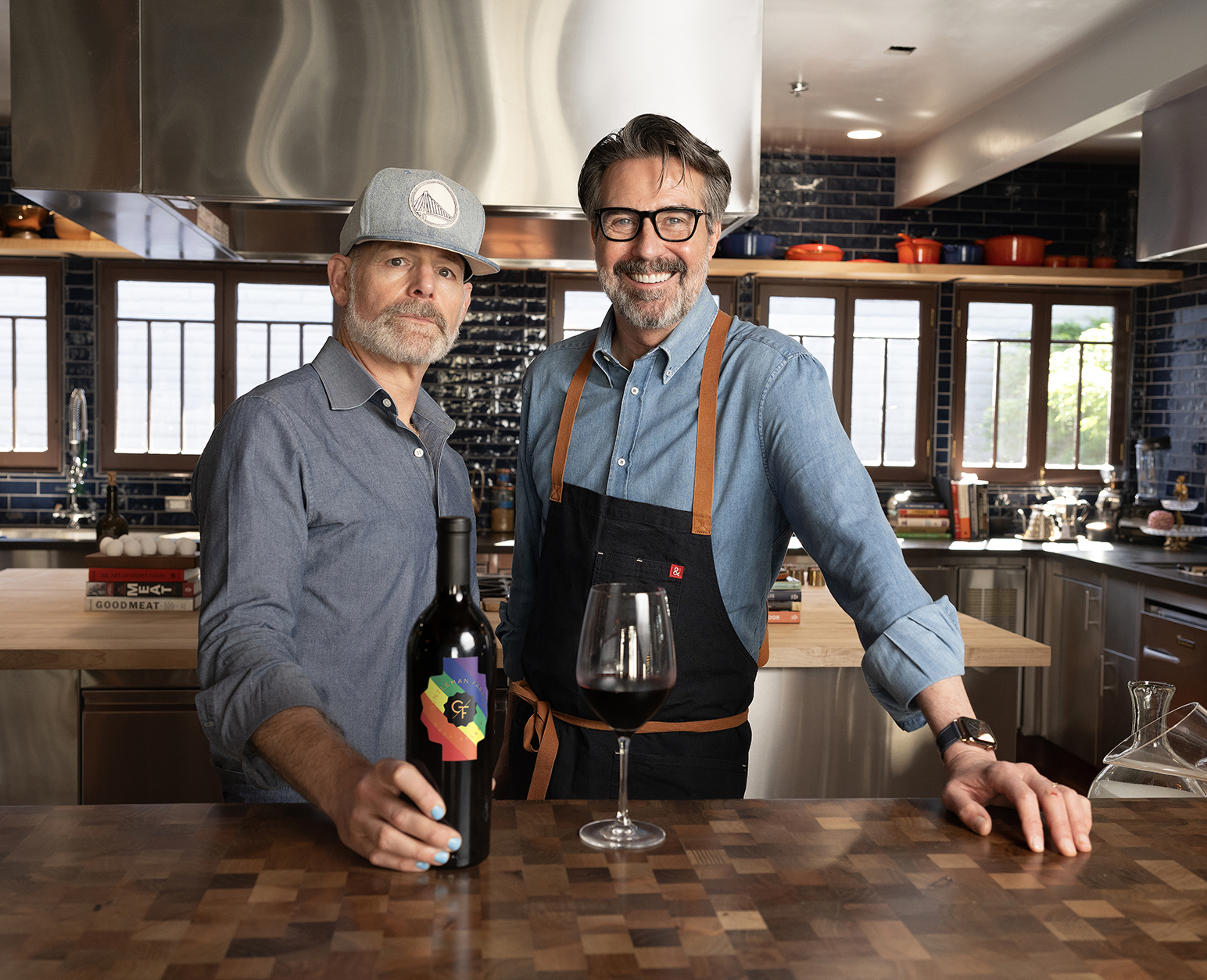

A reminder, 10% of all June wine sales are being donated to three LGBTQ+ youth organizations. On the national level is It Gets Better, on a broad San Francisco Bay Area level we are donating to LYRIC, and keeping it local in Napa with donations going to VOICES.
To celebrate we have made a special bottling of 2021 Gentleman Farmer Napa Valley Red Wine with a special label. Only 25 cases were produced.
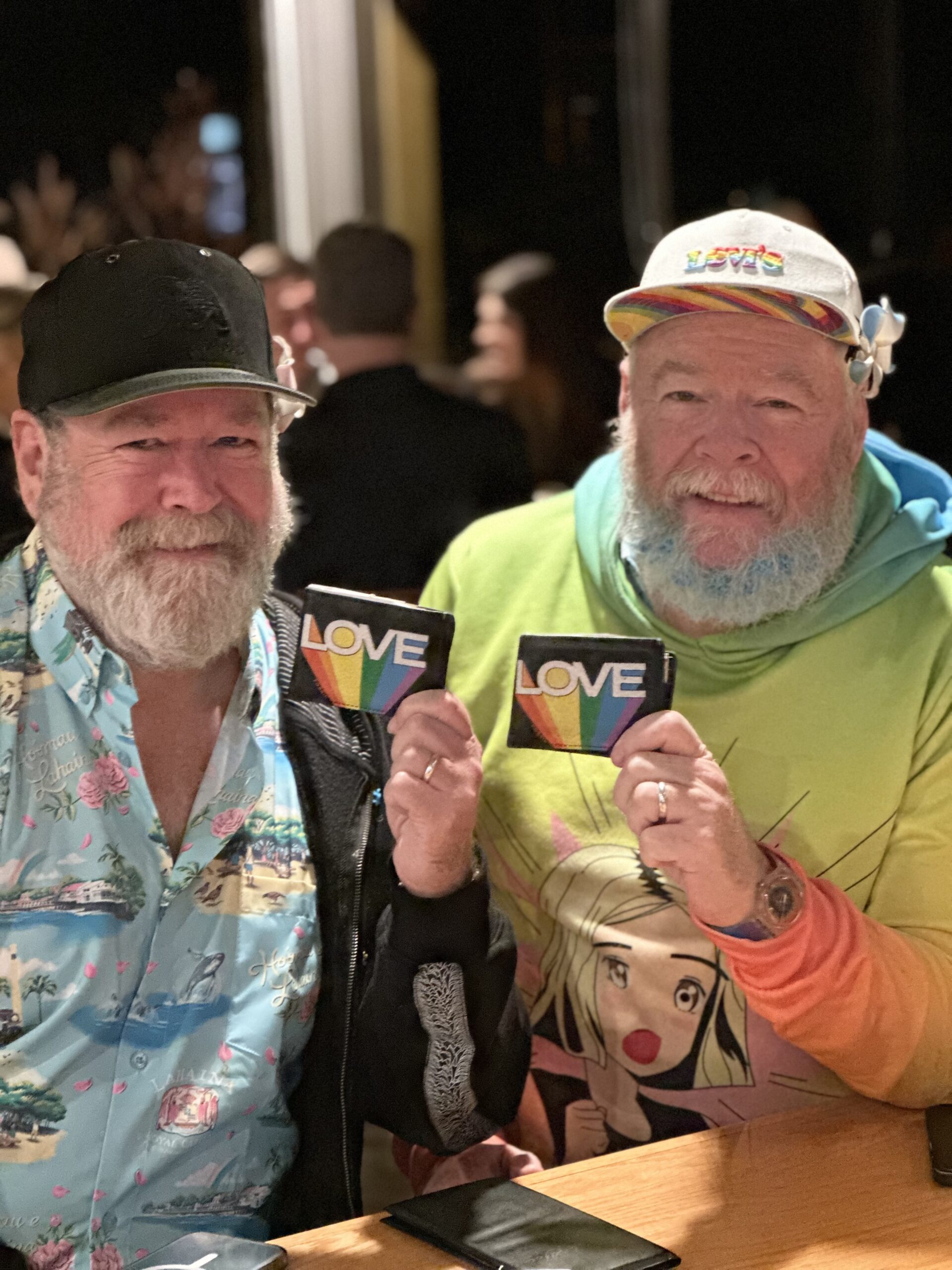
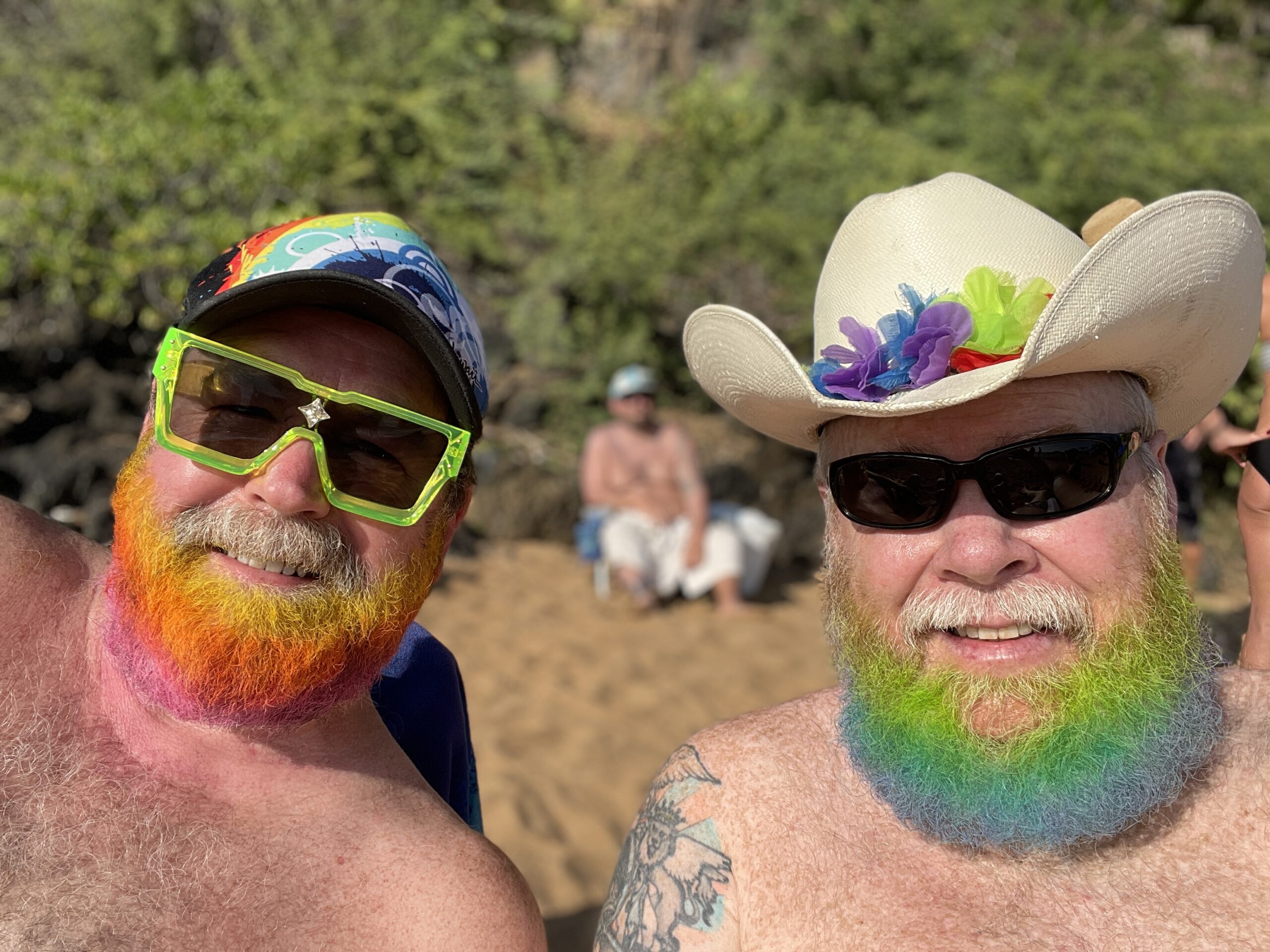
DJ Rotten Robbie has been spinning in the San Francisco area for over twenty years. He has shared billing with many, including The Bangles, The Fixx, Modern English, Village People, Sister Sledge, RuPaul, Martha Wash, Thelma Houston, Dionne Warwick, Kelly (Shoes), and Tiffany.
He’s played at iconic clubs and spaces in San Francisco including 1015 Folsom, Soundfactory, Club 8, 550 Barneveld, Holy Cow, Glas Kat, 440 Castro, Lone Star Saloon, Eagle Tavern and at the San Francisco City Hall. He spins globally with travel taking him to Los Angeles, Palm Springs, Alaska, Mexico, New Zealand, and Australia.
Robbie also holds a special space in my heart and Jeff’s, he was the DJ at our wedding in 2017. I personally can attest this guy can spin.
I had the pleasure of visiting with him and his husband Eric Oesterle at our Gentleman Farmer Bungalow, sharing a bit of wine, and catching up during his busy Pride schedule.
For our community and my Napa native Jeff, the visibility and pride that Robbie and Eric have created in the valley is heartwarming. You can follow DJ Rotten Robbie @djrottenrobbie
Joey Wolosz:
What is your involvement in Napa Pride, how has it changed, what do you see for its future?
Rob Doughty:
We helped start Napa Pride in 2003. We wanted to have a community event people could afford to go to. So in six weeks, we threw together what we called the Black Tee event. We had a dance at the now Blue Note, which was downstairs of the Napa Valley Opera House. Then we have a family picnic. So, we had to have an adult event and an all-ages event.
Eric Oesterle:
Deb Stalling said that out loud, she brought a voice to that, she said, “I think it’s time to do a Pride event in Napa.” We asked ourselves, “Are we ready to do a gay Pride event in Napa?” At that time, Rob and I still didn’t hold hands walking downtown.
RD:
It was a different time. When we announced that we were having those two events, the Adult Dance and the Family Picnic, people were calling and emailing, asking, “Will there be photographers there?” “What if there’s a bomb threat?” People were scared to come and be seen.
EO:
There was a young kid who wanted to come and be in drag. And he said, “Should I bring it? Will you have a place to change? Will I be safe?”
We said, “You’ll be okay.” We were like, knock on wood.
RD:
We didn’t know if Fred Phelps and his protesters would show up. The only thing that happened was at Kennedy Park, the morning of the picnic, there were Christian flyers put on the tables, awaiting us when we got there to set up.
EO:
They were well meaning, they felt that we were possibly not saved. I don’t remember them being mean, just anonymously critical. We use that first year to raise money for
.
RD:
We chose a mainstream charity to show that the LGBTQ community cares about the well-being of Napa. We raised $10,000.
EO:
We had 200 lesbian, gay, bi, and trans people at that first event. We were struggling with naming it. Do we call it a pride event? There was an open question among us queers, “What are we proud of?” This is the kind of thing that you hear from each other in a small town where people are not necessarily standing at the corner of 18th Street and Castro, dressing in rainbow colors every day.
I remember, at the Sunday picnic, a couple of youth stood up and said, “We’re going to do a talk session under that tree over there.”
Rob and I sat and we listened as one young adult after another said, “I’m bi, I’m queer, this is what I face at school.” “Teachers are not standing up and defending me with the name calling.” “I’m an ally. This is where I stand.” “I identify as trans or female presenting.”
It was just amazing to see young people stand up and say, in the strongest words they could, who they were.
RD:
They knew who they were more than the adults. We were finding pride knew where question,
EO:
I always tell people that our young people, at that very first event, taught me about pride, and what it means to represent.
RD:
About six or eight years ago, something happened at one of the organization meetings and everybody sort of walked away and left Pride with no infrastructure. Basically Napa Pride was up for grabs. Anybody that wanted to do an event could do an event. So, I just started throwing things together that I thought would be fun, and we became the de facto leaders of Pride because there was no longer an infrastructure.
Then Coach Bailie came along from LGBTQ Connection. She’s really been a strong force. Last year, we had 37 events on the calendar. This year, we’re already at 41. It’s just amazing to see.
I’m terrible at asking for donations. I wish I had somebody that could go out and ask for sponsorship, because I’d really like to have a Roller Disco. But a Roller Disco won’t pay for itself.
EO:
You need the underwriting to pay for the practical things. We need porta potties, we need security people. It’s not a lot of expense, but it is an effort.
I was living in San Francisco when we met. We take pride for granted. We take the queer energy for granted in the big city. Here, it’s easy to get kind of depressed about the greater state of the world. But here, we can see change immediately.
RD:
We have the ability to make a difference. We can see we’re making a difference.
EO:
The day after the first Napa Pride in 2003, Rob and I were holding hands, walking downtown. We saw people we knew and we were all smiling so broadly, our cheeks hurt from just making this thing happen with 250 people.
RD:
We were together for 25 years until we got married. I think some of the motivation was the changing climate. And I’m worried that we’re going to, somehow we’re gonna lose the ability to get married. Yeah,
EO:
My 90 year old mom took Rob aside and said, “When are you guys going to get married?”
RD:
I proposed to him and then his sister proposed to her girlfriend at the same time. We had weddings a week apart. She got to see both of her kids get married in one week, which was pretty amazing.
EO:
We have marched in the Fourth of July parade the past few years. I remember our friends, a lesbian couple, and their kids sat down with us at Scala. One of them said, “I haven’t really found comfort yet here. My kid my kids are getting teased a lot because they have two moms.”
I said, “Come march with us in the fourth of July parade.”
RD:
I said it will change your life. It will change your outlook on Napa. When you walk down the street, and people applaud you for being you, you will feel so supported and uplifted. She came and brought her kids and her wife. Afterwards, she said, “You were completely right. I haven’t seen my wife smile that much in a long time.”
That’s sort of the culmination of our pride month, finishing off with the Fourth of July parade. Last year, we were marching right in front of the Republican women’s organization.
EO:
One woman from the Republican women’s group congratulated us on our recent marriage. We marched together, this LGBT huge group with all the rainbows, and this woman and her group with all the red, white and blue, down Main Street, one after the other for the entire length. That’s an American moment in its ideal sense. It’s not fighting. We were existing together. We were having a civil moment.
We’re being trained to get engagement by being sharp online. When we come face to face, that’s less likely to happen.
RD:
People don’t like change, it makes them afraid and uncomfortable. Once they realize that change is inevitable, it’s so freeing. Instead of resisting change, maybe surrender to it. You don’t necessarily want things to be like they were in the 50s because they weren’t great in the 50s.
EO:
There’s also a lot of misrepresentation of a “queer agenda” online. We’re being used against each other. Everybody is being used against each other. You see pro-Palestinian, pro-Israeli, pro-Jewish, pro-Muslim voices, which are based on some of the same religious values being split apart from each other, being torn from each other.
With early pride, we came together, men and women, lesbians, bi, and trans people came together. We have more strength when we’re working on our commonalities, when we find the intersection of what we believe, rather than try to divide ourselves from each other.
I think of the pride calendar events in Napa Valley this year, they’re not necessarily protests. There are wine tastings. People are enjoying a meal with friends. They’re going out and dancing. Hopefully, people will see that and understand that togetherness is our agenda.
I’m really concerned about authoritarian movements in the US and Europe. How they leverage fear of underrepresented groups. I could get totally depressed if I only thought about that, this sort of global trend. But this small slice of where we are, outside the big city, and doing what we do, this is part of my therapy.
RD:
That’s one reason I never left Napa, I have so much more ability to make a change here. We spoke at River School 15 or 20 years ago, as a gay couple. Years later, we walked into Peet’s and the barista said, “Did you guys speak at River School years ago? I was just a little lesbian sitting in the back of the class. I thought it was the only gay person in town. You guys walked in the door and made me feel Napa was okay and that I was going to be alright.”
I really live by what Harvey Milk said, which was that we all have to come out because that will change how people vote, If everybody knows somebody who’s gay.
Trans people have been labeled as the boogeyman by the right, which is just insane. They’re such a very small minority, but they are labeled as such a threat.
Like when people say, no gender neutral bathrooms. My answer is every bathroom on an airplane is gender neutral. What’s the big deal?
When you’re in this echo chamber, this constant, repeating, repeating, repeating, that they’re out to get you they’re out to get your kids, it’s just about keeping us scared. If you compare the news and like Canada, it’s much more soft and feel good news. Here, it’s all about fear.
EO:
We let go of the Fairness Doctrine, which required that national broadcast outlets were fair in their reporting and I think that went during the Reagan era.
We were young gays emerging during the bear culture phase in the 1990s coming up with that, and being very masculine, butch presenting. We had friends say, “We’re doing the rodeo, but I don’t understand why the Sisters of Perpetual Indulgence are involved.”
RD:
It was a thing that some gay men didn’t like drag queens because it didn’t reflect them, but the drag queens always ended up on the front page of the paper for the parade in San Francisco.
EO:
Because, of course, color. Right?
I have to admit, I remember I’d see that they put drag queens with tossing batons at the front of the San Francisco parade and thought that didn’t represent the kind of everyday boring gays like me, maybe it draws some negative attention. These were the thoughts of a naïve, twenty-something, not understanding, not having learned, not having an elder gay tell me yet. Stonewall was drag queens, trans women of color. The most marginalized of the marginalized, who finally had enough. power.
Before the CDC gave out guidelines for safe sex, the Sisters of Perpetual Indulgence in San Francisco were like, “Here’s what we know, we’ve done our studying, here’s what we think is going on, here’s how to protect yourselves. We’re going to put this out there since the government hasn’t formed a consensus about how to talk to gay men about health safety.”
A lot of my evolution over the last 25 years of our relationship has been partly informed by embracing the people who are really different from me, not being an itchy, gay man who only goes to just the Lone Star in San Francisco, and doesn’t really interact with women, or trans people. I’m the partner of someone who produces drag shows and I work alongside lesbians with tools and build stuff. I would be a very different person if I weren’t a small town gay.
RD:
There’s a documentary called Small Town Gay Bar. it’s incredible. My friend Malcolm Ingram made it. It’s about these two gay bars in the deep south that are sanctuaries for queer people. We love going to small town gay bars, whether we’re in Missoula, Montana, or Coeur d’Alene, Idaho, because there isn’t enough to break out into niches, and everybody comes together. There’s the drag queens and the leather guys and the cowboys and the lesbians. They all dance on the dance floor together. It’s just so fun. I think that is what we have here, we’re still small enough that we haven’t broken out into segments.
EO:
It’s really a unique kind of power that we have in small towns by bringing together the spectrum.
COVID actually kind of brought the bright color dressing out in us. We were in the garage doing webcasting to support different organizations, the bartenders across the city you weren’t working.
We were live streaming on Instagram and thought let’s make it interesting, because we’d see other DJs podcasts that were awful, like a beige wall in their kitchen and they’re not even looking at the camera.
I said, “Let’s get all the inflatables, all the color. We gotta make this a party. I’m gonna do a drone shot over the pool.”
RD:
I grew out my beard. It was this palette. I could do anything I wanted with it. I also gave up a lot of my masculine presenting stuff, post COVID. I put glitter on my beard and I put rainbow clips in my beard. It’s also a shift. Turning 60 I thought my career would be over. I didn’t think people would want to hire me. Now with a little glitter on my beard, I’m magic.
EO:
He’s more popular now than he’s ever been, at 60, as a DJ.
RD:
My biggest goal is, and my biggest fear, is I want to start doing more remixes of songs and releasing them.
I have this vision. Elton John released an album, it was just as disco was sort of dying. It was during his really dark phase, when he was really into drugs. And it was the first time he worked without Bernie Taupin, his collaborator that he’s been with for 50 years. And he was with some of Donna Summers’ producers. He went into the studio and recorded all his vocals in one day. He released it and never promoted it. It’s this albatross around his neck. It was in Rolling Stone and one of the worst 50 albums of all time. But it’s really not awful.
He’s never performed any of the songs off it. I’d like to do a project where myself and my other DJ friends remix those songs for the modern dance floor. Because it’s actually quite good, it’s called Victim of Love. I think it could be a huge dance hit for him today with just some mixing. I’d like to get into that more. That’s been a dream of mine forever. And I do a little of it.
EO:
For events, he does edits and re-mixing. But we’re also at a point where we’re hanging on to some old technology that is holding him back a little bit as a potential producer remixer. So over the next few months we will probably be transitioning him to some new DJ tools and new production tools.
RD:
This learning curve is frightening to me.
EO:
A little frightening, but he’s gonna be fine. When I was a young software developer, about 29, I asked a friend why don’t we see more people older than us doing what we’re doing. He said when you’re 35 you go into management, you’re not hands on anymore, because you don’t have the brain for it. I kind of believed that for a while.
I was still doing a lot of software development and UX stuff and design, working in two dimensions. At 50, I transitioned to working on hardware. I’m working with industrial designers, and not being afraid to be new again, to be a newbie, again, to learn new technology, to make mistakes, to burn my hands while soldering. It’s energizing for me to do that, and I think it is for him.
RD:
He and I are unique, he stays on top of technology the way I stay on top of new music. A lot of people our age stop learning about technology or music around college age. Most people just don’t listen to new music or learn new technology.
EO:
When I’m prepping for an event for a group of people, maybe it’s a 70th birthday party, which means fifty two years ago they would be 18, which puts them at 1972. Let’s pull up the Billboard Charts for when they were in their senior year in high school. It’s going to be the banger for them, it’s gonna get them on the dance floor. And it’s reliable, but it’s also kind of sad.
Robbie’s so eclectic. Back when we were living in a converted chicken coop on North Avenue in Napa. He pulled out the turntable, and he was playing something amazing. He said, “Oh, you like that? You should listen to this, and this, and this.” We would go down this rabbit hole, following this thread, this aesthetic. He keeps all that stuff in his head. I’ve helped him with the technology now.
RD:
I had to do a Latin-ish event Friday night in Santa Rosa, bbut I was worried. I didn’t want to feel like a white guy playing Latin music for brown people. I wanted to be respectful and I asked, are you sure you don’t want to get a Latin to do this? They said no, they specifically asked for you.
But I went into it. I was stressed, I was nervous and I did lots of homework. I ended up killing it. It was just fantastic. It was one of those things to really go outside your comfort zone. I may not know the lyrics, what they’re saying, but I know that the music’s good and I know what they like and it was really fun.
JW:
Who would you like to have a long lingering meal with and what would you serve?
RD:
Julia Child.
EO:
Of course, Julia Child, There are a lot of lessons to take from her. She started her professional career in her 50s, maybe late 40s, maybe 50s.
RD:
She’s also an explainer,
EO:
And an interpreter, which we both love, and a teacher. Someone who instructs, not to be so afraid of this, do this. If it doesn’t work, here’s how you can fix it. Now you have this other sauce, the eggs curdled while making your Hollandaise? Well, run it through a food mill and then do this, then you have this sauce, you’re fine.
RD:
My second choice would be Questlove from the Roots, who was the drummer for Jimmy Fallon’s band, because he’s a major food guy and he’s a major music guy. He has these salons in New York where he brings together people who love food and music and has these incredible dinner parties where you may be with a major restaurateur, a published chef, and music artists. He loves Soul Train as much as I love Soul Train. He does these amazing documentaries. He’s one of my favorite people in the music world and in the culinary world.
EO:
I’d love to take Julia Child through the drive-thru, as we get into Hawaii, because she did love McDonald’s french fries. I’d love to have her try their guava fried pie.
RD:
I make these incredible ginormous salads with 20 different vegetables. We make this mélange of dressings, we pull out five or six different kinds of dressings, and mix them and match them based on our moods and our tastes.
I would serve them something super fun, detailed, and super seasonal.
I might serve them my bottle of champagne that Jay Z gave me at a Beyoncé concert. It’s sitting in our fridge, waiting for a special occasion that I don’t know will ever come. But, oh my God, when he gave me that bottle of champagne, I floated out of that place.
JW:
Any lessons on opening the good stuff?
RD:
A lesson we learned was don’t bring a really good bottle of wine to a party, because it’ll just end up on a table with a bunch of other bottles. It won’t be appreciated or celebrated.
EO:
Here’s this bottle of wine that you’ve been holding on to, why are you not drinking it with these three great friends that you have? Here’s your opportunity to bring that out. It doesn’t have to be an engraved invitation occasion. Make your friends know that you feel that they’re special.
JW:
What is your motto?
RD:
It’s not a party without a disco ball.
It has been that forever. I give out disco ball necklaces. When people put them on, there’s this light switch that goes off and they immediately feel like part of the party. And they say that they’re magical. And I’m about to get a disco ball vending machine.
EO:
Make a prototype.
That’s something I learned from working with designers who have really wild ideas. The Creative Director may say, “Well, we’re gonna save that for another time.”
I think, hold on, that’s a really interesting idea that the competition isn’t doing or that we aren’t doing yet. Give me two hours. I’ll put together something with LEDs or microcomputers and microcontrollers or something or a beautiful case. I’ll bring it back and they can touch it. They’ll fall in love with their own idea again, and now it has some energy behind it. If I make them a prototype that’s tangible, we can all fall in love with the idea and we may do it.
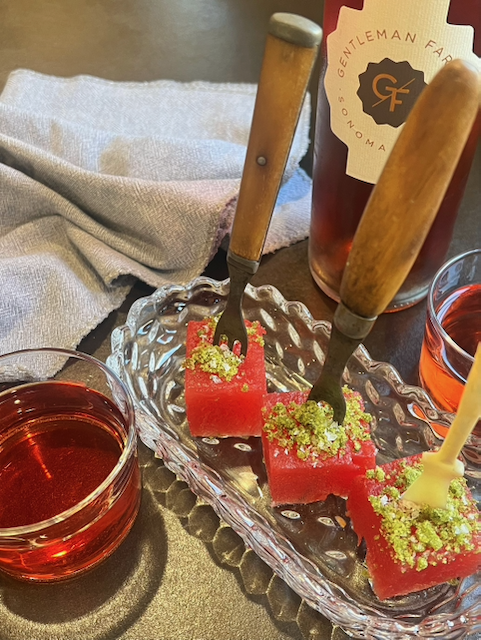
Chilled Rosé Compressed Watermelon with Basil Sugar and Sea Salt
Summer heat is upon us; it is 100ºF outside our bungalow today, and the last thing I’m interested in doing is firing up the stovetop or the oven.
The idea behind these treats came quickly. Yesterday, I was in the market to get some leeks when I spotted the bin of watermelons. I had just seen a recipe online for a peach cake with basil sugar. I’ve been re-reading the post-apocalyptic novel, In Watermelon Sugar. The two ideas fused together and this came to mind. Or maybe it was Harry Styles on the radio. Nonetheless, I had the rough workings for a refreshing summer treat.
Compressing watermelon at the highest setting not only evenly distributes the hefty dose of rosé, it sets a vibrant hue to the once just pink melon flesh. This electric pink color is complemented by the spring green of the basil.
Enjoy these chilly bites by the pool with a glass of rosé.
